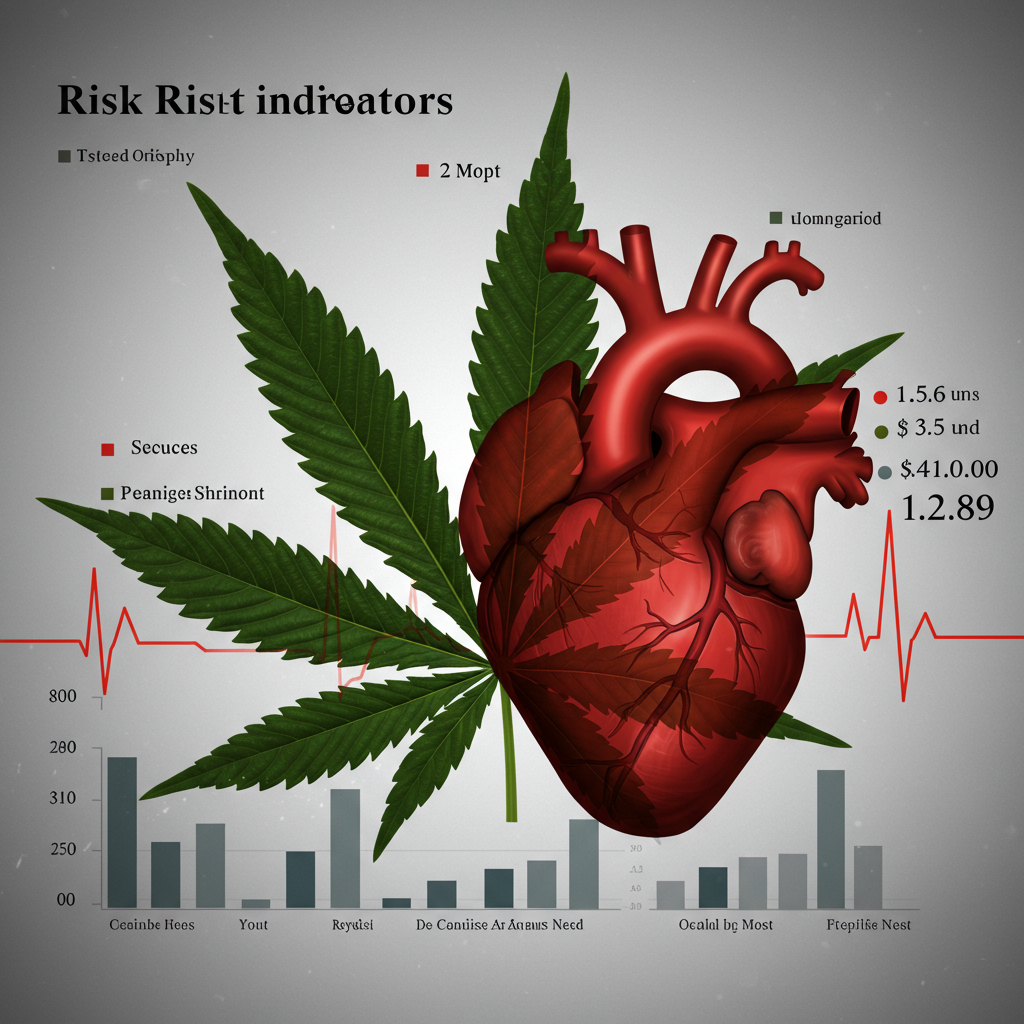As cannabis becomes more widely available and accepted for both medicinal and recreational purposes, questions about its long-term health effects are increasingly important. While often perceived as relatively harmless, particularly compared to substances like tobacco, a growing body of scientific research is raising concerns about its potential impact on cardiovascular health.
Recent large-scale studies suggest a significant association between cannabis use and an increased risk of serious heart problems, including a doubled risk of death from cardiovascular disease.
Major Study Highlights Significant Cardiovascular Risks
A comprehensive meta-analysis, pooling data from 24 previous studies published between 2016 and 2023 and involving approximately 200 million people, found a clear link between cannabis consumption and major adverse cardiovascular events (MACE). The research, led by a team at the University of Toulouse in France and published in the journal Heart, revealed:
A 100 percent increased risk (doubled risk) of death from cardiovascular disease.
A 29 percent increased risk for acute coronary syndrome (conditions involving sudden reduced blood flow to the heart, such as heart attacks).
A 20 percent increased risk for strokes.
These findings prompted the researchers to state that healthcare professionals should investigate cannabis use in all patients presenting with serious cardiovascular disorders.
Why This Research is Timely
The context of these findings is crucial. With increasing legalization worldwide, user profiles and consumption habits are changing dramatically. This includes a notable trend towards higher potency products, particularly those with elevated concentrations of delta-9-tetrahydrocannabinol (THC). Daily cannabis use is becoming more common, even comparable to daily tobacco or alcohol use in some age groups, including those in the 35-50 range where cardiovascular disease often begins to develop.
Understanding the Limitations and Nuances
It’s important to note that the Heart meta-analysis, while drawing on a massive dataset, highlights an association, not direct cause and effect. Limitations in the included studies, such as variations in how cannabis use was defined, reliance on self-reporting, lack of data on consumption over time, and potential for bias, mean that other unconsidered factors could potentially influence both cannabis use and heart health outcomes.
Supporting Evidence from Other Research
However, the Heart study’s findings are supported by other recent research exploring different aspects of cannabis’s impact on the cardiovascular system:
Early Vascular Damage: A separate study published in JAMA Cardiology by researchers at the University of California, San Francisco (UCSF), investigated the effects on early markers of cardiovascular disease. This cross-sectional study found that both chronic cannabis smoking and using THC edibles were linked to impaired vascular endothelial function – the health of the inner lining of blood vessels – which is an early predictor of future heart problems. Interestingly, the study suggested smoking and edibles might impact blood vessels through different mechanisms.
Links to Serious Events in Younger Adults: Another large retrospective analysis in JACC Advances, covering over 4.6 million individuals under age 50, found alarmingly high risks among marijuana users compared to non-users: more than a sixfold increased risk for heart attack, a fourfold risk for ischemic stroke, and a threefold risk for a combined endpoint of cardiovascular death, heart attack, or stroke.
Consistent Heart Attack Risk: A meta-analysis presented to the American College of Cardiology, pooling data from 12 studies and 75 million people, similarly found that current marijuana users were 1.5 times more likely to suffer a heart attack than non-users.
These studies, exploring both early indicators and serious events across different large populations, contribute to a growing “cloud of smoke,” or even signs of a “wildfire,” suggesting a consistent link between cannabis use and cardiovascular issues.
Implications for Health and Public Awareness
Given the increasing evidence, experts are suggesting a shift in how cannabis use is viewed and discussed within healthcare. The argument is being made that cannabis should be treated similarly to tobacco from a public health perspective – not necessarily criminalized, but discouraged, with efforts focused on educating the public about potential risks.
Recommendations include:
Increased Screening: Doctors should routinely ask patients about cannabis use during cardiovascular risk assessments, just as they do for smoking. Some experts argue this screening should extend to all patients, not just those with existing heart conditions.
Public Education: There’s a need for greater awareness campaigns to counter the “false perception” that cannabis is entirely safe, especially when used for health ailments.
- Regulation and Warning Labels: Policymakers should consider integrating heart disease and stroke prevention into cannabis market regulations, potentially including mandatory health warning labels on products, restrictions on marketing, and limits on product potency.
- www.sciencealert.com
- www.kqed.org
- www.fox32chicago.com
- www.yahoo.com
- www.newsweek.com
The Need for Continued Research
While current studies establish concerning associations and challenge the notion of cannabis as harmless, more research is crucial. Future investigations need to delve deeper into specific chemical compounds within cannabis (like THC versus CBD), understand the mechanisms by which they might affect the heart, explore the risk profiles associated with different consumption methods (smoking, vaping, edibles), and determine if any usage levels might be considered safe over the long term.
In conclusion, the emerging scientific picture indicates that while research is ongoing and complex, the potential link between cannabis use and serious cardiovascular events, including a doubled risk of heart disease death, is significant enough to warrant caution, increased awareness, and further comprehensive investigation.



